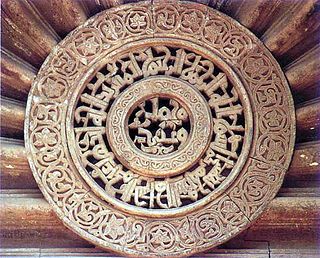Related Research Articles

Hadith or Athar refers to what most Muslims and the mainstream schools of Islamic thought believe to be a record of the words, actions, and the silent approval of the Islamic prophet Muhammad as transmitted through chains of narrators. In other words, the ḥadīth are attributed reports about what Muhammad said and did.
In Islam, sunnah, also spelled sunna, are the traditions and practices of the Islamic prophet Muhammad that constitute a model for Muslims to follow. The sunnah is what all the Muslims of Muhammad's time evidently saw and followed and passed on to the next generations. According to classical Islamic theories, the sunnah are documented by hadith, and alongside the Quran are the divine revelation (wahy) delivered through Muhammad that make up the primary sources of Islamic law and belief/theology. Differing from Sunni classical Islamic theories are those of Shia Muslims, who hold that Imams interpret the sunnah, and Sufi who hold that Muhammad transmitted the values of sunnah "through a series of Sufi teachers".

The Quran, also romanized Qur'an or Koran, is the central religious text of Islam, believed by Muslims to be a revelation from God. It is organized in 114 chapters which consist of individual verses. Besides its religious significance, it is widely regarded as the finest work in Arabic literature, and has significantly influenced the Arabic language.
Tafsir refers to exegesis, usually of the Quran. An author of a tafsir is a mufassir. A Quranic tafsir attempts to provide elucidation, explanation, interpretation, context or commentary for clear understanding and conviction of God's will.
John Edward Wansbrough was an American historian of Islamic origins and Quranic studies and professor who taught at the University of London's School of Oriental and African Studies (SOAS), where he was vice chancellor from 1985 to 1992.
Naskh is an Arabic word usually translated as "abrogation". In tafsir, or Islamic legal exegesis, naskh recognizes that one rule might not always be suitable for every situation. In the widely recognized and "classic" form of naskh, one ḥukm "ruling" is abrogated to introduce an exception to the general rule, but the text the ḥukm is based on is not repealed.
Occasions or circumstances of revelation names the historical context in which Quranic verses were revealed from the perspective of traditional Islam. Though of some use in reconstructing the Qur'an's historicity, asbāb is by nature an exegetical rather than a historiographical genre, and as such usually associates the verses it explicates with general situations rather than specific events. The study of asbāb al-nuzūl is part of the study of Tafsir.
Criticism of Islam, including of Islamic beliefs, practices, and doctrines, can take many forms, including academic critiques, political criticism, religious criticism, and personal opinions.

The Spirit is mentioned twenty one times in the Quran, where it is described as issuing from command of God. The spirit acts as an agent of divine action or communication.
The history of the Quran, the holy book of Islam, is the timeline and origin of the written compilations or manuscripts of the Quran, based on historical findings. It spans several centuries, and forms an important major part of the early history of Islam.
Taḥrīf is an Arabic-language term used by Sunni and Shia Muslims to refer to believed alterations made to the previous revelations of God—specifically those that make up the Tawrat, the Zabur and the Injil. This belief has also been advocated by Quran alone Muslims. The term is also used to refer to what Muslims consider to be the corrupted Jewish and Christian interpretations of the previous revelations of God, known as “Tahrif al-Mana”. This concept holds that the previous revelations of God have been misinterpreted, as opposed to altered in text.

‘Iṣmah or ‘Isma is the concept of incorruptible innocence, immunity from sin, or moral infallibility in Islamic theology, and which is especially prominent in Shia Islam. In Shia theology, ismah is characteristic of prophets, imams, and angels. When attributed to human beings, ismah means "the ability of avoiding acts of disobedience, in spite of having the power to commit them". Along with a pure constitution, excellent qualities, firmness against opponents, and tranquility (as-Sakinah), ismah is a divine grace bestowed by God.
The Quran is viewed to be the scriptural foundation of Islam and is believed by Muslims to have been sent down by Allah (God) and revealed to Muhammad by the angel Jabreel (Gabriel). The Quran has been subject to criticism both in the sense of being the subject of an interdisciplinary field of study where secular, (mostly) Western scholars set aside doctrines of its divinity, perfection, unchangeability, etc. accepted by Muslim Islamic scholars; but also in the sense of being found fault with by those — including Christian missionaries and other skeptics hoping to convert Muslims — who argue it is not divine, not perfect, and/or not particularly morally elevated.

Uzair is a figure who is mentioned in the Quran, Surah at-Tawbah, verse 9:30, which states that he was "revered by the Jews as the son of God". Uzair is most often identified with the biblical Ezra and according to some with the ancient Egyptian deity Osiris. Historians have described the reference as enigmatic since such views have not been found in Jewish sources. Islamic scholars have interpreted the Quranic reference in different ways, with some claiming that it alluded to a "specific group of Jews".
The verse of purification refers to verse 33:33 of the Quran, the central religious text in Islam. The verse concerns the status of purity of the Ahl al-Bayt, the last passage of which reads,
God only desires to remove defilement from you, O Ahl al-Bayt, and to purify you completely.

Criticism of ḥadīth or hadithical criticism is the critique of ḥadīth—the genre of canonized Islamic literature made up of attributed reports of the words, actions, and the silent approval of the Islamic prophet Muhammad.
Islam is an Abrahamic monotheistic religion teaching that there is only one God (Allah) and that Muhammad is His last Messenger.

Harut and Marut are a pair of angels mentioned in the Quran Surah 2:102. They are said to tempt humans by teaching them the arts of sorcery (siḥr) in Babylon.
Quranism is an Islamic movement that holds the belief that the Quran is the only valid source of religious belief, guidance and law in Islam. Quranists believe that the Quran is clear, complete, and that it can be fully understood without recourse to the hadith and sunnah. Therefore, they use the Quran itself to interpret the Quran, an exegetical principle known as tafsir al-Qur'an bi al-Qur'an.
Superstition is an excessively credulous belief in supernatural causality: the belief that one event is the cause of another without any physical process linking the two, such as astrology, omens, witchcraft, and apotropaic magic. According to Rashid Shaz, belief in such supernatural causality is widespread in the Muslim world and predates the introduction of Islam. He argues they involve "clinging to false hope" and even shirk.
References
- ↑ Braswell, George W. (2000). What You Need to Know about Islam & Muslims. B&H Publishing Group. ISBN 9780805418293.
- ↑ Anwar, Syed Shakeel Ahmed (2007). The Holy Quran is Infallible: A Critique of the Book "Is the Qur'an Infallible?" by 'Abdullah 'Abdal-Fadi, a Minister of Christ. Telugu Islamic Publications Trust. ISBN 9788188241736.
- ↑ Zayd, Naṣr Ḥāmid Abū (2006). Reformation of Islamic Thought: A Critical Historical Analysis. Amsterdam University Press. p. 32. ISBN 978-90-5356-828-6.